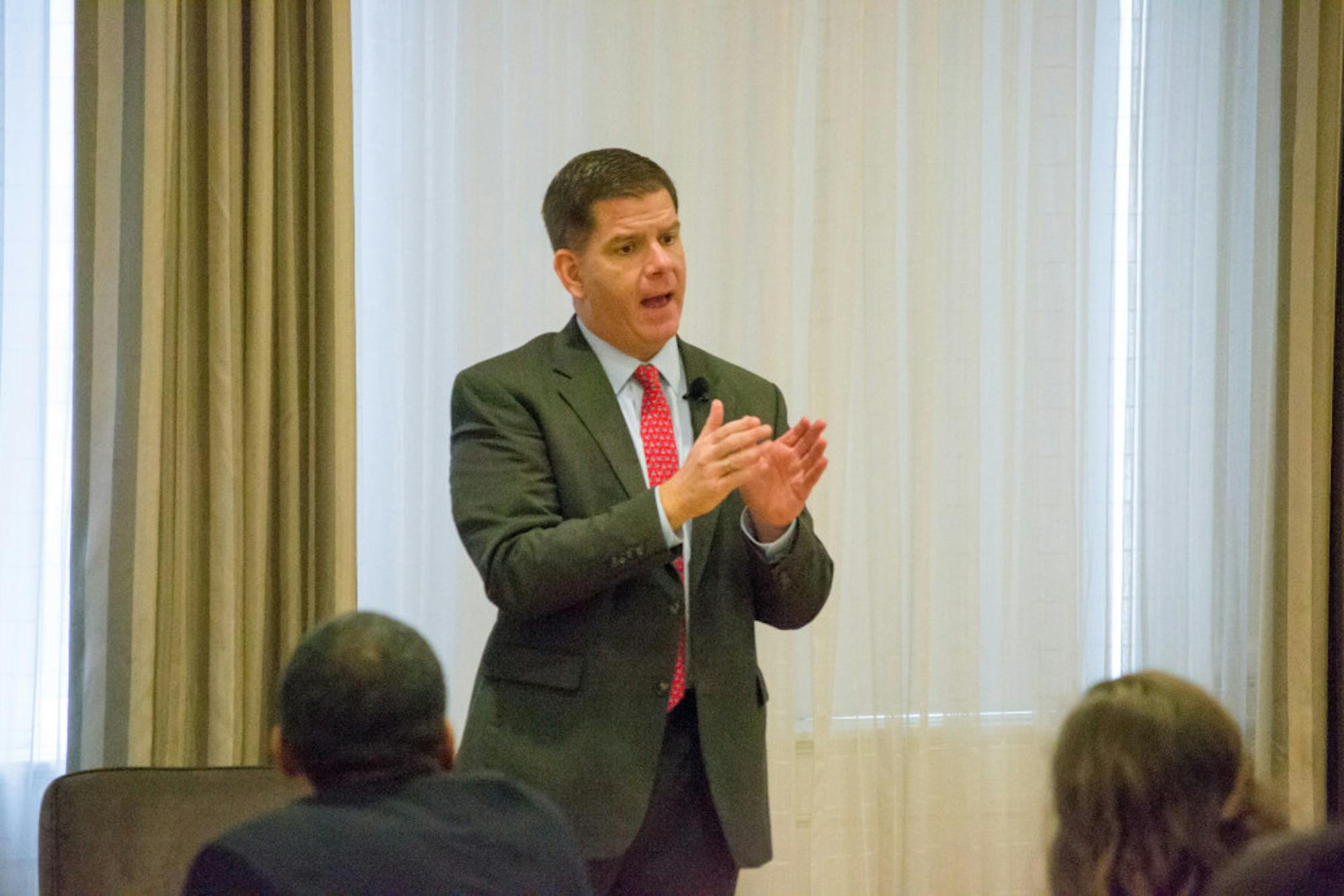Boston Mayor Martin Walsh joined Tufts community members for a conversation on his personal history with public service, the importance of civic engagement, the continued unrest in Ferguson, Mo. and his vision for Boston yesterday morning in the Alumnae Lounge.
Walsh, a Boston native, began his service as the 54th mayor of the City of Boston in January, having served previously as a member of the Massachusetts House of Representatives for 16 years. He is know for his passionate advocating for marriage equality, strengthening Boston’s education system and improving job opportunities for Boston residents, Alan Solomont (A '70), the Pierre and Pamela Omidyar Dean of the Jonathon M. Tisch College of Citizenship and Public Service at Tufts, explained in his opening remarks.
Structured as a question and answer session first between Walsh and Solomont and then between the mayor and the audience, the discussion was opened by Solomont posing a question about political disengagement among millennials, referencing a statistic that only one-fifth of young voters casted ballots in the midterm elections last month.
“Politics are so important to our society," Walsh said. "It’s discouraging when you see so many people disengaged in the political process or only engaged in the political process around the presidential election.”
Further expressing concern regarding this disengagement, Walsh explained that without the voice and vote of young citizens, politicians are not held accountable to this demographic.
“The government doesn’t have to pay attention to what the people are wanting because young people aren’t voicing,” he said.
In discussing the conflict that has broken out in Ferguson following a Missouri grand jury’s Nov. 24 decision not to indict white police officer Darren Wilson for the fatal shooting of unarmed black teenager Michael Brown,Walsh explained that it is the fundamental issues of racial and economic inequality that are driving the conflict.
“There are fundamental issues in urban America -- in cities and towns -- that we have to deal with as a nation,” he said. “It is time for us in America, or at least in Boston, to have a race conversation … Young people are looking at me thinking, ‘Okay let's have this conversation,’ but it’s the middle-aged people that don’t want to have it. We have to put all the cards on the table to unite our city and our country.”
Walsh explained that body cameras and demilitarization of police forces -- topics that have emerged at the forefront of a national discussion on police reform -- do not get to the heart of the problem. Instead, Walsh maintained that education and employment initiatives that expand access to opportunity should be prioritized.
Discussing his plans for Boston’s police force and for his administration more generally, Walsh explained that he is committed to having an administration that is representative of Boston’s demographics. Thus, as the governing body of a city comprised of 52 percent people of color,Walsh believes his administration should reflect this.
“One of the things that we did at the start of my administration is we talked about the leadership of the police department," he explained. "At the time, I think there were only two or three people of color on the command staff. One of the first things [Police Commissioner William Evans] did was create a 50 percent people of color command staff for the first time in the history of Boston. Of the 11 districts, three of our district commanders are people of color for the first time in the history of Boston ... We have a lot of firsts going on.”
Similarly, Walsh said he is working to increase the number of people of color in his cabinet.
“Fifty percent of my cabinet isn’t people of color yet, but we’re heading towards that goal," Walsh said. “We’re at about 40 percent now.”
As a testimony to this commitment, Walsh announced the appointment of Shaun Blugh as Boston’s first chief diversity officer yesterday, just hours after leaving Tufts.
Addressing questions from the audience, Walsh also discussed his plans to assist Boston’s youth population -- including the establishment of the Late Night Task Force and the development of policy surrounding emerging companies such as Uber and Airbnb -- his plans to preserve the middle class and expand affordable housing and how Boston’s Trust Act relates to national immigration reform.
The breakfast discussion was the fourth event in the inaugural Tisch College Distinguished Speaker Series. The series has brought U.S. Sen. Elizabeth Warren (D-Mass.), former Secretary of Health and Human Services Kathleen Sebelius and National Political Columnist for Yahoo! News Matt Bai (LA ’90) to campus this semester.
Mayor Walsh discusses youth vote, police reform






